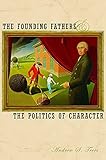The Founding Fathers and the Politics of Character / Andrew S. Trees.
Material type: TextPublisher: Princeton, NJ : Princeton University Press, [2021]Copyright date: ©2003Description: 1 online resource (232 p.) : 16 halftonesContent type:
TextPublisher: Princeton, NJ : Princeton University Press, [2021]Copyright date: ©2003Description: 1 online resource (232 p.) : 16 halftonesContent type: - 9780691233536
- HISTORY / United States / Revolutionary Period (1775-1800)
- Alien and Sedition Acts
- American Revolution
- Antifederalists
- Bingham, William
- Brackenridge, Hugh Henry
- Burroughs, Stephen
- Cabot, George
- Charlotte Temple
- Constitutional Convention
- Continental Congress
- Cruger, Catherine Church
- Declaration of Independence
- Euripides
- Federalist Papers
- Federalists
- Freneau, Philip
- Fries Rebellion
- Gender
- Gentility
- Gerry, Elbridge
- Granger, Gideon
- Great Britain
- Habermas, Jurgen
- Hippolytus
- Hutcheson, Frances
- Irving, Washington
- Jefferson, Thomas
- Johnson, Samuel
- King, Rufus
- Knox, Henry
- Livingston, Susanna
- Madison, Dolley
- Monroe, James
- Muhlenberg, Frederick
- Nullification
- Pickering, Timothy
- Political culture
- Publius
- Republicanism
- Scottish enlightenment
- Sterne, Laurence
- Tazewell, Henry
- Venable, Abraham
- Warner, Michael
- Warren, James
- Washington, George
- Webster, Noah
- Whiskey Rebellion
- Wills, Garry
- Wolcott, Oliver
- XYZ Affair
- 973.4 23
- online - DeGruyter
| Item type | Current library | Call number | URL | Status | Notes | Barcode | |
|---|---|---|---|---|---|---|---|
 eBook
eBook
|
Biblioteca "Angelicum" Pont. Univ. S.Tommaso d'Aquino Nuvola online | online - DeGruyter (Browse shelf(Opens below)) | Online access | Not for loan (Accesso limitato) | Accesso per gli utenti autorizzati / Access for authorized users | (dgr)9780691233536 |
Frontmatter -- CONTENTS -- ILLUSTRATIONS -- PREFACE -- ACKNOWLEDGMENTS -- Introduction -- ONE Friendship -- TWO Honor -- THREE Virtue -- FOUR Justice -- CONCLUSION Veneration -- NOTES -- INDEX
restricted access online access with authorization star
http://purl.org/coar/access_right/c_16ec
The American Revolution swept away old certainties and forced revolutionaries to consider what it meant to be American. Andrew Trees examines four attempts to answer the question of national identity that Americans faced in the wake of the Revolution. Through the writings of Thomas Jefferson, John Adams, Alexander Hamilton, and James Madison, Trees explores a complicated political world in which boundaries between the personal and the political were fluid and ill-defined. Melding history and literary study, he shows how this unsettled landscape challenged and sometimes confounded the founders' attempts to forge their own--and the nation's--identity. Trees traces the intimately linked shaping of self and country by four men distrustful of politics and yet operating in an increasingly democratic world. Jefferson sought to recast the political along the lines of friendship, while Hamilton hoped that honor would provide a secure foundation for self and country. Adams struggled to create a nation virtuous enough to sustain a republican government, and Madison worked to establish a government based on justice. Giving a new context to the founders' mission, Trees studies their contributions not simply as policy prescriptions but in terms of a more elusive and symbolic level of action. His work illuminates the tangled relationship among rhetoric, politics, self, and nation--as well as the larger question of national identity that remains with us today.
Mode of access: Internet via World Wide Web.
In English.
Description based on online resource; title from PDF title page (publisher's Web site, viewed 24. Aug 2021)


